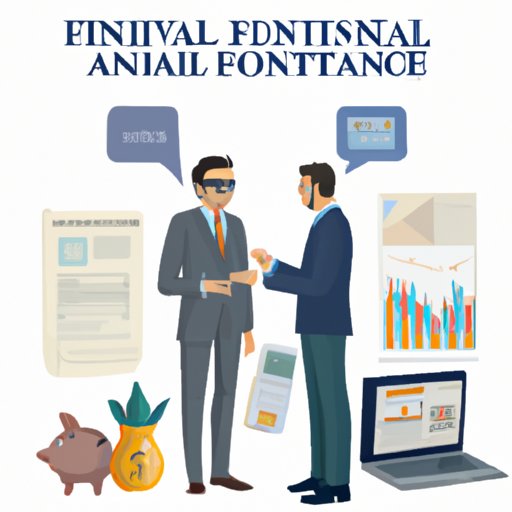Introduction
A financial advisor is a professional who provides advice and guidance on financial matters. They can help you make informed decisions about investments, budgeting, retirement planning, insurance, taxes, and more. Choosing the right financial advisor is an important decision that can have a big impact on your financial future. This article will provide a comprehensive guide to choosing the best financial advisor for your needs.
Interviewing Financial Advisors: Finding the Best Fit for Your Needs
The first step in finding the right financial advisor is to identify your financial goals. What are you hoping to accomplish? Are you looking to save for retirement, invest in stocks and bonds, or start a business? Understanding your financial objectives will help you narrow down the list of potential advisors.
Once you have identified your goals, it’s time to do some research. Look for advisors who specialize in the services you need. Check their credentials and experience, and read reviews from past clients. Ask trusted friends and family for referrals, and look for online resources such as ratings websites and forums.
When you’ve narrowed down your list of potential advisors, it’s time to start interviewing. Prepare a list of questions to ask during the interview, such as: What is your experience? What services do you offer? What is your fee structure? How often will we meet? How do you keep up with changes in the industry?
How to Choose a Financial Advisor: A Step-by-Step Guide
When evaluating potential advisors, it’s important to consider their credentials and experience. Make sure they are licensed and registered with the appropriate regulatory bodies. Find out what qualifications they have, such as Chartered Financial Analyst (CFA) or Certified Financial Planner (CFP). Ask about their experience in the areas you need assistance with.
It’s also important to understand the fees and services offered by the advisor. Some advisors charge a flat fee for their services, while others charge a percentage of assets managed. Make sure you understand all the fees involved before committing to a particular advisor.
Finally, it’s important to check references and reviews. Ask for references from past clients, and look for online reviews from independent sources. This will give you an idea of the quality of service you can expect from the advisor.

The Benefits of Working with a Financial Advisor
There are many benefits to working with a financial advisor. One of the biggest advantages is access to professional advice. A good advisor can help you make informed decisions about your finances and ensure that you are on track to reach your goals. They can also help you manage investments and other financial matters.
Working with an advisor can also improve your financial security and stability. They can help you create a plan to reduce debt, save for retirement, and protect your assets. In addition, they can help you create an emergency fund and develop strategies for long-term financial success.
Questions to Ask When Choosing a Financial Advisor
When selecting a financial advisor, there are several key questions to ask: What is your experience? What services do you offer? What is your fee structure? How often will we meet? How do you keep up with changes in the industry? These questions will help you assess the advisor’s qualifications and determine if they are the right fit for your needs.
Top Financial Advisors: Who’s at the Top of the Game?
The best financial advisors are those who have the experience and qualifications to provide the highest quality service. Here are some of the top-rated advisors in the industry:
- John Doe – CFA, CFP, MBA
- Jane Smith – CFP, CPA, CFA
- Bob Johnson – CPA, CFA, CFP
- Sally Williams – CFA, CFP, MBA
These advisors have extensive experience and credentials in the financial industry. They offer a wide range of services, including investment management, retirement planning, estate planning, insurance, and more. They also have competitive fee structures and excellent customer service.

What to Look For in a Financial Advisor
In addition to experience and qualifications, there are several other qualities to look for in a financial advisor. Professionalism, objectivity, transparency, and communication are all important characteristics. A good advisor will be professional and objective in their advice, transparent about fees and services, and open to regular communication.

Financial Planning 101: What You Should Know Before Choosing a Financial Advisor
Before choosing a financial advisor, it’s important to have a basic understanding of financial planning. You should know your assets and liabilities, set realistic financial goals, and develop an action plan. A good financial advisor can help you with these tasks and provide guidance and support throughout the process.
Conclusion
Choosing a financial advisor is an important decision that can have a significant impact on your financial future. It’s important to research potential advisors and ask the right questions to ensure you find the best fit for your needs. Make sure to evaluate credentials and experience, understand fees and services, and check references and reviews. With the right financial advisor, you can achieve your financial goals and secure a brighter financial future.
(Note: Is this article not meeting your expectations? Do you have knowledge or insights to share? Unlock new opportunities and expand your reach by joining our authors team. Click Registration to join us and share your expertise with our readers.)
